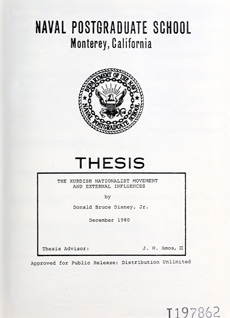|
INTRODUCTION
The Kurds, as a tribally organized nation, have existed in the Middle East since ancient times. Centered predominantly in the area of modern Iraq, Iran, and Turkey, with smaller groups in Syria and the USSR, they have interacted with the various migratory flows and imperial regimes throughout the region's history.
With the rise of nationalism in the Ottoman Empire in the late 19th century, the first Kurdish modern revolt occurred under the leadership of Sheikh Ubeidullah. This was followed by the development of early Kurdish political groups and other expressions of nationalism in the early 20th century. After World War I, Kurdish nationalist aspirations were, encouraged by the Treaty of Sevres but were to be deflated by the actions of Turkey, Iraq, Great Britain and the Soviet Union.
The 1920's and 1930's saw a multiplicity of Kurdish revolts and the growth of an urbanized political intelligentsia as the Kurds interacted with the new assertive nation-states among which they were divided. At the end of World War II, the Soviet-sponsored Mahabad Republic came into being.
It was ended after the Soviet withdrawal from, and Iranian occupation of the area in 1946.
During the post-World War II period the Kurds were fairly quiescent due to efforts of regional powers to control them. They were subjected, however, to a propaganda campaign between the United States and the Soviet Union through most of the period. In 1961 Mulla Mustafa Barzani rose in revolt in Iraq and was not fully defeated until 1975. The period from 1975 to 1980 saw a splintering of Kurdish political parties, suppression of Kurds in Iraq and Turkey, and a renewed Kurdish revolt in Iran af ter the fall of the Shah.
Throughout most of Kurdish modern history, external influences ranged from overt aid to the Kurds in revolt, to use of the Kurds against a neighboring country, to cooperative regional efforts to control Kurdish movements. While the Kurdish tribal element has remained strong and has provided most of the insurgents in the field, an extensive political organization has also developed to represent the movement. It has consisted of parties within each country which maintained links with each other and which also maintained links to Kurdish political groups abroad. These overseas groups also have established ties to extra regional actors to obtain support for the Kurdish movement.
The hypothesis examined in this thesis was: The importance of Kurdish nationalism and its vitality are dependent upon the greater conflict of which it is a part; to wit: the status of governments in, and disputes between the regional actors as well as the power roles of external actors in the Northern Tier and Persian Gulf region. The methodology employed was a historic examination of Kurdish national revolts coupled with a study of the systemic interactions between Kurdish tribalism, Kurdish political parties, aspects of modernization, and the roles of external actors. Primary external actors considered were Turkey, Iran, Iraq, the United States, the Soviet Union, and Israel.
| 